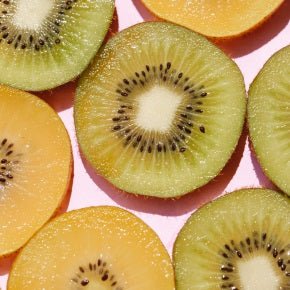The kiwi is an unusual item to find in a typical British lunchbox but it may be worth swapping the crisps or biscuits for one or two of the small, furry fruit according to the latest research, which has highlighted some of its many health benefits.
Find out more in this week’s Nutrition News.
The health benefits of kiwi
Many people believe that kiwi fruit is native to New Zealand but they actually originate from south west China and boast a wealth of health benefits.
Botanically classed as a berry, one of the kiwi’s most prolific health benefits comes from the plant compounds they contain, which hold antioxidant and anti-inflammatory properties. This article by Healthline lists some of the other benefits that might convince you to pack a kiwi with your lunch next time.
A 100g portion, which is just over one average kiwi fruit, contains just 64 calories but over three quarters of your recommended daily intake of vitamin C. Kiwis are also a great source of vitamin E, folate, vitamin K, copper, potassium and magnesium.
The vitamin C content means that kiwis offer great support to a range of processes in the body including the normal function of the immune system, the protection of cells from oxidative stress and a reduction in tiredness and fatigue. Healthline cites a number of studies that illustrate the effectiveness of kiwi fruit for increasing vitamin C intake and therefore providing the body with sufficient levels to stay healthy.
In addition to its vitamin content, kiwi fruit is also a great source of dietary fibre, which is important for gut health and digestion. Taking these health benefits into consideration, kiwi fruit makes for a relatively low calorie but nutrient dense snack and worthy addition to the diet.
Study links vitamin D and fish oil with reduced risk of autoimmune diseases
A recently published study by the BMJ has established a link between vitamin D and fish oil with reduced risk of developing autoimmune diseases.
Autoimmune diseases are a family of around 80 related illnesses that affect the immune system where the body mistakes your own cells for foreign cells and begins to attack them. The study found that, in women over the age of 55 and men over the age of 50, vitamin D supplementation saw a 22% reduction in autoimmune diseases and a 15% percent reduction in the same with fish oil over a 5.3 year period with randomised follow up.
As these diseases increase in prevalence with age, the study suggests that these two important nutrients could be a relatively easy and effective way of living a longer, healthier life.
The heart health benefits of wild olive oil
Olive oil and the benefits of the Mediterranean diet have been touted for many years but a recent study has found that wild olive oil could have further benefits for heart health than we first realised.
Besides significantly lowering blood pressure, it is thought that wild olive oil, also known as ACE oil, can counteract the harmful effects of arterial hypertension by exerting vasodilator, antihypertensive, antihypertrophic, and antifibrotic effects. Both olive oil and olive leaf contain polyphenols such as hydroxytyrosol, oleuropein complexes and tyrosol, which are packed with antioxidants that protect the body’s cells from oxidative stress and it is thought that it could be these properties that hold the key to the substance’s heart health benefits.
The study by the British Medical Journal, reported by NutraIngredients, involved test subjects that were either part of a control group, or fed a standard diet supplemented with ACE oil. One of the test groups had hypertension whilst the other had blood pressure within the normal ranges. The study found that the group fed the ACE oil saw a noticeable drop in systolic and diastolic blood pressure, although the values remained higher than those of the test subjects with normal blood pressure.
While further research is needed, the study provides useful insight into the potential benefits of olive oil.
Share your thoughts
Agree with the findings in this week’s Nutrition News? Share your thoughts with us on Facebook and Twitter.
 Alison is the Founder of Metabolics who writes about Metabolics updates, events and natural healthcare. Her experience and passion for natural supplements and healthcare comes from her years of experience as a practising osteopath, having founded Metabolics in her search for high quality, natural products in her own work. Alison has been a qualified and practising Osteopath since 1981 and regularly gives seminars on a range of healthcare subjects to the wider practitioner community helping share her knowledge and experience.
Alison is the Founder of Metabolics who writes about Metabolics updates, events and natural healthcare. Her experience and passion for natural supplements and healthcare comes from her years of experience as a practising osteopath, having founded Metabolics in her search for high quality, natural products in her own work. Alison has been a qualified and practising Osteopath since 1981 and regularly gives seminars on a range of healthcare subjects to the wider practitioner community helping share her knowledge and experience.




